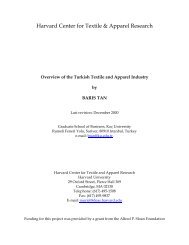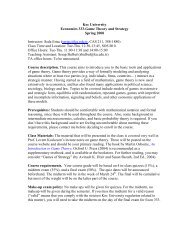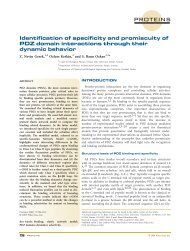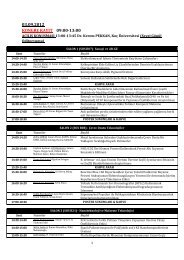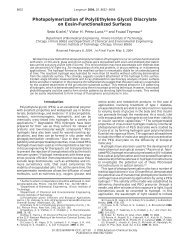RELATIVE INCOME HYPOTHESIS
RELATIVE INCOME HYPOTHESIS
RELATIVE INCOME HYPOTHESIS
You also want an ePaper? Increase the reach of your titles
YUMPU automatically turns print PDFs into web optimized ePapers that Google loves.
Relative Surplus Value<br />
with income at a given point in time but average wellbeing<br />
tends to be highly stable over time despite tremendous<br />
income growth. Easterlin argued that these patterns<br />
are consistent with the claim that an individual’s wellbeing<br />
depends mostly on relative income rather than<br />
absolute income. Subsequent research, such as that published<br />
by Andrew Oswald in 1997, has accumulated<br />
abundant evidence in support of this claim.<br />
Relative income hypothesis has also found some corroboration<br />
from indirect macroeconomic evidence. One<br />
of these is the observation that higher growth rates lead to<br />
higher saving rates, which is inconsistent with the lifecycle/permanent-income<br />
theory since the lifetime<br />
resources of an individual increases as growth rate<br />
increases. The work of Christopher Carroll, Jody<br />
Overland, and David N. Weil explains this observation<br />
with a growth model in which preferences depend negatively<br />
on the past consumption of the individual or on the<br />
past average consumption in the economy that is under<br />
the relative income hypothesis.<br />
Another empirical observation that has been problematic<br />
for the life-cycle/permanent-income theory is the equity<br />
premium puzzle, which states that the observed difference<br />
between the return on equity and the return on riskless assets<br />
is too large to be explained by a plausible specification of the<br />
theory. Introducing past average consumption into the preferences<br />
accounts for this observation much better.<br />
Relative income hypothesis has other important economic<br />
implications. Perhaps the most obvious implication<br />
is that consumption creates negative externalities in<br />
the society, which are not taken into account in individual<br />
decision-making. If individuals consume, and therefore<br />
work, to increase their status, then they will tend to work<br />
too much relative to the socially optimal level and hence<br />
income taxation could improve the social welfare.<br />
Relative income hypothesis is a special case of negatively<br />
interdependent preferences according to which individuals<br />
care about both their absolute and relative material<br />
payoffs. In 2000 Levent Koçkesen, Efe Ok, and Rajiv Sethi<br />
showed that negatively interdependent preferences yield a<br />
higher material payoff than do selfish preferences in many<br />
strategic environments, which implies that evolution will<br />
tend to favor the emergence of negatively interdependent<br />
preferences. This could be regarded as one explanation for<br />
the empirical support behind relative income hypothesis.<br />
SEE ALSO Absolute Income Hypothesis; Consumption;<br />
Life-Cycle Hypothesis; Microfoundations; Modigliani-<br />
Miller Theorems; Permanent Income Hypothesis<br />
BIBLIOGRAPHY<br />
Abel, Andrew B. 1990. Asset Prices under Habit Formation and<br />
Catching Up with the Joneses. American Economic Review 80<br />
(2): 38–42.<br />
Boskin, Michael J., and Eytan Sheshinski. 1978. Optimal<br />
Redistributive Taxation when Individual Welfare Depends<br />
upon Relative Income. Quarterly Journal of Economics 92 (4):<br />
589–601.<br />
Campbell, John Y., and John H. Cochrane. 1999. By Force of<br />
Habit: A Consumption-Based Explanation of Aggregate<br />
Stock Market Behavior. Journal of Political Economy 107 (2):<br />
205–251.<br />
Carroll, Christopher D., Jody Overland, and David N. Weil.<br />
1997. Comparison Utility in a Growth Model. Journal of<br />
Economic Growth 2 (4): 339–367.<br />
Carroll, Christopher D., Jody Overland, and David N. Weil.<br />
2000. Saving and Growth with Habit Formation. American<br />
Economic Review 90 (3): 341–355.<br />
Duesenberry, James S. 1949. Income, Saving and the Theory of<br />
Consumer Behavior. Cambridge, MA: Harvard University<br />
Press.<br />
Easterlin, Richard. 1974. Does Economic Growth Improve the<br />
Human Lot? Some Empirical Evidence. In Nations and<br />
Households in Economic Growth, ed. Paul A. David and<br />
Melvin W. Reder. New York: Academic Press.<br />
Friedman, Milton. 1957. A Theory of the Consumption Function.<br />
Princeton, NJ: Princeton University Press.<br />
Koçkesen, Levent, Efe A. Ok, and Rajiv Sethi. 2000. The<br />
Strategic Advantage of Negatively Interdependent<br />
Preferences. Journal of Economic Theory 92 (2): 274–299.<br />
Modigliani, Franco, and Richard Brumberg. 1954. Utility<br />
Analysis and the Consumption Function: An Interpretation<br />
of Cross-Section Data. In Post-Keynesian Economics, ed.<br />
Kenneth K. Kurihara. New Brunswick, NJ: Rutgers<br />
University Press.<br />
Oswald, Andrew J. 1997. Happiness and Economic<br />
Performance. Economic Journal 107 (November): 1815–1831.<br />
Levent Koçkesen<br />
<strong>RELATIVE</strong> SURPLUS<br />
VALUE<br />
Relative surplus value is a concept introduced by Karl<br />
Marx in chapter 12 of the first volume of his book Capital<br />
(1867). One of the key objectives of this book was to<br />
explain the origins of capitalist profit. Marx argued that<br />
profits could not arise simply from trading between commodity<br />
owners because such trade was what von<br />
Neumann (1944) would later call a zero sum game.<br />
Instead, the source of profit had to be sought outside the<br />
sphere of circulation in the process of capitalist production.<br />
Here, labor power that had been purchased by the<br />
capitalist was set to work to make things. The amount of<br />
value created by the laborers would be proportional to the<br />
number of hours worked whereas the sum advanced by<br />
the capitalist to purchase labor power would be proportional<br />
to the value of that labor power itself as a commod-<br />
154 INTERNATIONAL ENCYCLOPEDIA OF THE SOCIAL SCIENCES, 2ND EDITION



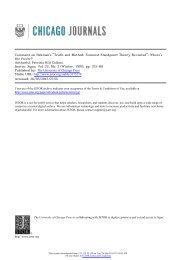
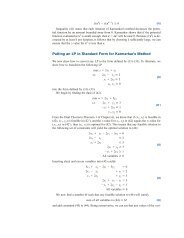
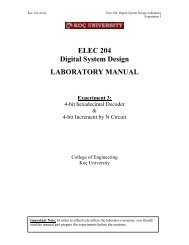
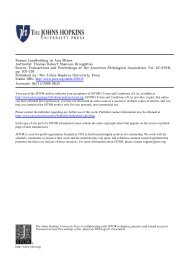
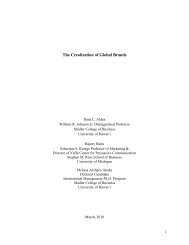
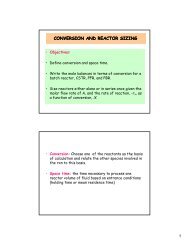
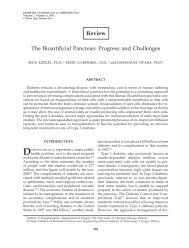
![]_[O](https://img.yumpu.com/10363126/1/190x138/-o.jpg?quality=85)
